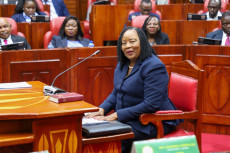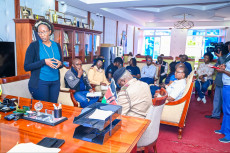- Endometriosis is a chronic illness where tissue similar to the uterine lining grows outside the womb, leading to intense pain, heavy bleeding, organ damage, and, in some cases, infertility.
For many years, women battling endometriosis have faced unbearable pain, financial struggles, and feelings of isolation, all while being invalidated, misdiagnosed, or told that their suffering is just a normal part of being a woman. Endometriosis is a chronic illness where tissue similar to the uterine lining grows outside the womb, leading to intense pain, heavy bleeding, organ damage, and, in some cases, infertility.
Despite affecting 1 in 10 women globally, research on endometriosis remains underfunded, and it takes an average of 7 to 10 years to receive a diagnosis. Countless women endure their pain in silence, but some bravely speak out, using their voices to raise awareness and advocate for improved treatment options.
In Kenya, three remarkable women—Ciru Muriuki, Natalie Githinji, and the late Mary Njambi Koikai—have been vocal about their experiences with endometriosis, shedding light on a condition that is often misunderstood.
Mary Njambi Koikai, also known as Jahmby Koikai, was a fierce champion for endometriosis awareness. As a reggae MC and media personality, she battled thoracic endometriosis, a rare form of the disease that caused her lungs to collapse repeatedly.
Njambi fought tirelessly not only for her survival but for all women enduring endometriosis. She used her voice to bring attention to the financial strain of treatment, the lack of specialized care in Kenya, and the dismissive attitudes many women face from healthcare providers.
Despite undergoing numerous surgeries, she continued to advocate for endometriosis awareness until her untimely passing in 2024. Her death served as a painful reminder of the consequences of medical neglect and the urgent need for improved healthcare systems to support women with chronic illnesses.
Media personality Ciru Muriuki has also shared her battle with endometriosis. In 2023, she publicly shared her journey with the disease, detailing the excruciating pain, emotional toll, and challenges in obtaining a proper diagnosis.
Like many women, Ciru faced years of misdiagnosis before finally finding clarity. Through her platform, she has played a crucial role in educating others about the realities of endometriosis, dispelling the myth that period pain is something women should endure silently.
Media personality and content creator Natalie Githinji has spoken openly about the financial and emotional hardships that come with endometriosis. She has shared her experiences of seeking medical help only to be dismissed by doctors, leading her to rely on personal funds for costly treatments.
Natalie's advocacy has focused on the necessity of affordable healthcare for women with endometriosis. The expenses of surgeries, hormonal treatments, and pain management are often beyond the means of many Kenyan women, leaving them to suffer without adequate care.
Endometriosis goes beyond painful periods—it is a complex illness that can affect multiple organs, cause chronic fatigue, and contribute to depression and anxiety. The costs of managing the condition are overwhelming:
Surgical procedures (like laparoscopies) can range from Ksh 500,000 to Ksh 1,000,000. Hormonal treatments may result in severe side effects, such as mood swings and bone loss.
Pain management often involves opioids or potent anti-inflammatory medications, which carry long-term health risks. Losing income due to frequent absences and job loss impacts financial stability.
Women with endometriosis often find themselves financially depleted, struggling to maintain consistent employment, and unable to afford proper care. Without medical insurance or government assistance, many suffer in silence.
Despite the challenges and pain, individuals like Njambi Koikai, Ciru Muriuki, and Natalie Githinji have played a vital role in bringing endometriosis to the forefront of public discourse. Their stories underscore the need for:
Improved diagnosis and treatment where more Kenyan healthcare professionals must be trained to identify endometriosis and provide adequate care.
Government policies should guarantee that women with chronic conditions can access treatment without financial hardship. Further education is essential to dispel misconceptions and encourage early detection.


-1771054698-md.jpeg)




-1771054698-sm.jpeg)


